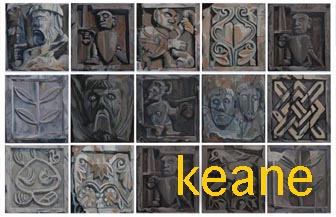Tony Moscardini once thrived in the fast-paced chaos of Glasgow’s newspaper world—a life of ink-stained deadlines and urban drizzle. But seeking something gentler, he left it all behind for a small, sunlit hill town in rural Tuscany. There, among olive groves and cobbled lanes, he found photography, guerrilla filmmaking—and love.
But Tuscany’s tranquillity comes with its own unease. For all its beauty, the slower pace has begun to feel repetitive. So, when Tony returns to Glasgow for a brief visit, the past resurfaces. Old colleagues, forgotten emotions, and a chance encounter with a woman from his past pull him into a weekend of reckoning. Has he changed, or has he simply been hiding?
This is the premise of The Newspaper Man, the debut novel by David Belcher, a former cultural commentator whose byline once appeared in the Glasgow Herald, NME, Sunday Post, Radio Times, and more. Known for his wit and sharp observational style, Belcher turns his talents to fiction with remarkable ease.
Despite its title, The Newspaper Man isn’t a tale about journalism. Instead, it’s a story of flawed men, perceptive women, and the emotional weight of memory. At the heart is Tony – a man caught between two cultures and two versions of himself. The novel follows his journey through nostalgia, regret, and the bittersweet pull of places that shaped him.
Belcher’s deep affection for Barga, the Tuscan city with strong Glaswegian ties, informs much of the book’s setting. Having spent many holidays there, he was struck by the seamless switch between Italian and Glaswegian among the locals. One shopkeeper’s response to his hesitant Italian—“Aye, that’s about three euros, son”—captures this cultural crossover with charm and humour.
The novel moves fluidly between Scottish grit and Tuscan warmth, with moments of poignancy that linger. In one memorable scene, Tony shares drinks with an elderly Scots-Italian who recalls a life spent not among vineyards, but in the post-industrial greyness of Ayrshire. The conversation, rich in Glaswegian slang and emotional honesty, underlines the book’s themes of migration, identity, and place.
Written during the 2020 lockdown, the novel became Belcher’s pandemic project. “I got fed up with half-finished DIY and decided to finish the book,” he says. He initially envisioned it as a film and only later shaped it into a full-length novel—one that grew to 115,000 words before careful editing.
Belcher acknowledges the challenge of transitioning from journalism to fiction. “Writing a novel is much harder,” he admits. But The Newspaper Man proves more than capable. It’s smart, funny, deeply human, and refuses easy categorisation.
At sixty, Belcher reflects on the advantages of age. “You know more—about people and about yourself. In my twenties, I wasn’t ready.” The result is a novel steeped in lived experience and honest introspection.
The Newspaper Man is available now from AMAZON. A moving tale of identity, memory, and second chances—told with a distinctly Scottish voice and a Tuscan soul.
Tony Moscardini viveva immerso nel caos frenetico del giornalismo di Glasgow, tra scadenze serrate, inchiostro e pioggia. Ma, in cerca di qualcosa di più calmo e forse più autentico, ha lasciato tutto per trasferirsi in una cittadina collinare e assolata della campagna toscana. Lì ha riscoperto la fotografia, il cinema indipendente – e l’amore.
Tuttavia, anche il paradiso ha le sue ombre. Nonostante la bellezza del luogo, la vita tranquilla ha iniziato a sembrargli un po’ troppo prevedibile. Così, durante un breve ritorno a Glasgow, il passato riaffiora. Vecchi colleghi, emozioni dimenticate e un incontro inaspettato con una donna di un tempo lo spingono a fare i conti con sé stesso. È davvero cambiato Tony, o si è solo nascosto dietro il sole toscano?
Questa è la trama de L’Uomo del Giornale, romanzo d’esordio di David Belcher, ex commentatore culturale noto per le sue firme su Glasgow Herald, NME, Sunday Post, Radio Times e molti altri. Celebre per il suo umorismo tagliente e lo sguardo acuto, Belcher si cimenta con sorprendente naturalezza nella narrativa.
Nonostante il titolo, il libro non parla propriamente di giornalismo. È invece una storia di uomini imperfetti, donne sagge e dei legami profondi della memoria. Al centro, Tony – un uomo sospeso tra due culture e due identità. Il romanzo segue il suo viaggio tra nostalgia, rimpianti e il richiamo dolceamaro dei luoghi che ci formano.
L’affetto di Belcher per Barga, città toscana legata da secoli alla comunità italiana di Glasgow, permea tutto il racconto. Dopo numerose vacanze in zona, l’autore è rimasto colpito dalla naturalezza con cui gli abitanti passano dall’italiano al dialetto scozzese. In una scena emblematica, una negoziante risponde al suo incerto italiano con un perfetto glaswegian: “Aye, that’s about three euros, son”.
Il romanzo si muove con grazia tra il realismo scozzese e la luce toscana, regalando momenti toccanti. In uno di questi, Tony beve con un anziano italo-scozzese che racconta la sua vita trascorsa non tra vigne e cipressi, ma tra le fabbriche dismesse dell’Ayrshire. Una conversazione intensa, in dialetto e verità, che coglie il cuore dei temi del romanzo: migrazione, identità, appartenenza.
Scritto durante il lockdown del 2020, il libro è nato come progetto personale. “Mi ero stancato del bricolage fallito e ho deciso di finirlo”, racconta Belcher. Nato inizialmente come sceneggiatura, il romanzo ha preso forma durante la pandemia, raggiungendo 115.000 parole prima del lavoro finale di revisione.
Belcher ammette quanto sia difficile passare dal giornalismo alla narrativa. “Scrivere un romanzo è molto più complicato.” Ma L’Uomo del Giornale è la prova che ne valeva la pena: intelligente, divertente, umano, e fuori da ogni etichetta facile.
A sessant’anni, riflette: “Con l’età si sa di più – sugli altri, e su sé stessi. A vent’anni non ero pronto.” Il risultato è un libro ricco di esperienza e sincera introspezione.
L’Uomo del Giornale, di David Belcher, è disponibile ora da AMAZON. Un racconto toccante su identità, memoria e seconde possibilità – con voce scozzese e anima toscana.





